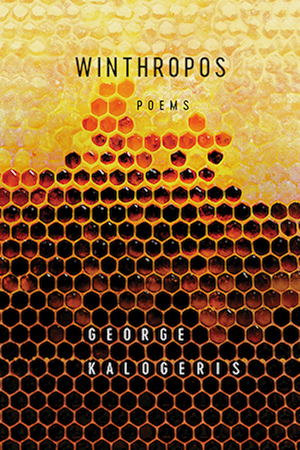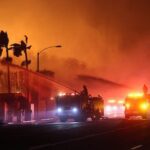Winthropos
By: George Kalogeris
Published: LSU Press (2021)
On a small and hilly peninsula of Massachusetts looking out onto the Atlantic and in across Boston Harbor, Winthrop, as it has been known since 1852, is today a commuter suburb of just under 20,000 people, a town of modest homes and quiet storefronts, of crowded docks and pebbly beaches, where 737s fly low overhead on their descent into nearby Logan Airport. Since the beginning of its settlement in the early 1600s by migrant Puritans wondering (it may be hard to imagine now) at the richness of its soil and abundance of its fisheries (without much examining how their violent defense of those settlements constituted an invasion to the indigenous Pawtucket people there before them), it has gone by many other names: Pullen Point, Rumney Marsh, Winissimett, Chelsea, Point Shirley, North Chelsea. Now that we have George Kalogeris’s latest collection of poems—which center around his upbringing in this seaside town as a second-generation Greek American and which imbue it and the world at large with a uniquely somber wit and nobility—we can add the name of Winthropos.
The name comes from Kalogeris’s father, as we learn in the eponymous childhood reminiscence that opens this collection. The father, in Socratic fashion, is gently quizzing a young George (as many a parent has done with their children) to see whether he is old enough to find his way home. “And if you get lost, Yorgáki, what will you do? / . . . ‘I’ll tell them where I live.’ / . . . / And where is that? ‘Winthrop.’” But then his father adds a twist: “Winthrop, Yorgáki, or is it Winthropos?” It’s a delicate little poem, with subtle, unpredictable end rhyme and a dramatically fluid iambic line. And it hinges at its midpoint upon the slightest Greek-like inflection of the town’s name—a dad joke, if you will—by means of which his father lays special claim to the town they call home—one that does not deny the claims of others but instead enriches them.
Little though it be, the poem’s structure is of a piece with the book’s many attempts at yoking together experiences and cultures not easily reconciled. Greek and American, young and old, home and abroad, past and present, safe and imperiled, the living and the dead—Kalogeris’s poems continually mediate between these various pairs. The four tercets of “Winthropos,” for example, are split evenly between show and tell, his youth and his middle age, his instruction and his reflection. Even the first two tercet’s punchier stichomythic rhythm of question-and-answer underscores the complementary and responsive natures of father and son. When in the second two tercets the perspective shifts to the poet’s adulthood after his father’s death, his sense of befuddlement at his father’s earlier lighthearted Greekification of the name of Winthrop is captured by a fittingly contorted syntax:
Only now that I’m older than he ever was,
And even in late middle age wherever I am
In my life I still don’t have the foggiest clue,
Do I hear the rhyme. Obvious, unavoidable.
It tells me the answer to the Sphinx’s riddle
Is Anthropos. My father pulling my leg.
What eventually becomes obvious to Kalogeris may not entirely be so for the reader. Winthropos does rhyme with Greek “Anthropos,” or man, what Oedipus answered when the Sphinx challenged him to guess what creature walks on four feet, then two, then three. Yet while a rhyme may answer, it does not solve. It only offers another riddle. What does Oedipus’s answer mean for the poet? Is it homecoming? A recognition of the gentle humanity of the father, pulling the son’s leg? The son’s puzzling over the riddle’s meaning through the years and in so doing becoming the man? Or perhaps it alludes to the human comedy that had been playing out around Kalogeris without his full understanding but which he time and again dutifully reconstructs, with rhyme answering rhyme as son answers father, as Winthrop his parents’ Peloponnese, as poet his predecessors.
Or as book answers book, for Winthropos is very much a companion volume to Kalogeris’s previous collection, Guide to Greece (LSU Press, 2018), not breaking new stylistic ground but rather, as is more commonly spoken of with respect to fantasy and science fiction genres, building out a world. A crucial difference is that where Kalogeris’s guidance through this world had previously come from his inventively reimagined version of the ancient Greek travel writer, Pausanias, that guidance is now more likely to come directly from his dearly departed Greek immigrant parents or from master poets such as Adam Zagajewski, Seamus Heaney, C.P. Cavafy, or Juan de la Cruz, who each in their way have not only trued his moral compass but deepened his sense of craft. His father especially, described often enough as a grocer in his butcher apron as to make that description seem like an Homeric epithet, is a model of a man who says much with little. In “The Old Country,” a title referring to his father’s characteristic use of that expression, Kalogeris tries to unpack its meaning:
Convenient, catch-all lingo. Allowing my father
To tell us where he was coming from
Without going into all
The murky details.
Though just the same a shadowy flicker of fear
And humiliation, perhaps even pent-up
Rage, seemed to play over
His open face.
Considering the lengths to which Kalogeris goes to provide the nuance his father exhibited (the poet’s analysis develops over another twenty-one lines), you might think he had done his father’s simple eloquence a disservice. But the words “murky details” have a ring not unlike “fog of war.” They too, like the phrase “the old country” itself, only allude to the hardship and loss of home and homeland that befell the million and more migrants of the modern Greek diaspora. It befell them during the war for their independence from Ottoman rule. It continued through the chaos unspooling at the end of World War II and the ensuing multi-factional Greek Civil War pitting left against right, the causes and consequences of which are too great to number but which in their totality might explain his “pent-up / rage” (how right that enjambment showing the surplus of emotion his paternal reticence could not contain).
Or in “Calchas Reading the Signs,” where his father—at the family grocery butchering meats while listening to the news on the war in Vietnam in what we may assume to be 1968, the year of the North Vietnamese Army’s seventy-seven day bombardment of the U.S. Marine’s garrison in Khe Sanh—appears to Kalogeris to work out his concerns for young George’s older, draft-eligible cousins as though his father were the mythical seer for the Greek army whose reading of animal entrails predicted the fall of Troy:
Nobody knows whose number will come up.
But our Calchas isn’t taking any chances.
Already he’s built another hecatomb,
And now he’s scrutinizing some gristly turkey
Intestines unfurling for all I know like the coils
Of giant lianas he saw in Guadalcanal
As a young recruit. But through that throbbing bamboo
Mesh I hear the Hydra’s serpentine hiss
He heard as a village boy way up in the Peloponnese.
These lines are typically dense with allusions to ancient Greek myths and customs (Calchas, Hydra, hecatomb), glimpses of personal history (the father’s occupation, military service, and boyhood homeland), and evocations of world historical events via placename (Guadalcanal and Peloponnese—like Khe Sanh earlier in the poem, the enchantingly foreign sound of which on the father’s old radio has the same concentrating force on Kalogeris as Greek horta, stafýlia, pepónia, vrisi, and gklítsa do in other poems in this collection). Just as typical is the way Kalogeris looking back on this past deftly ligatures these elements into what almost passes for the living and fully articulated present (the way, for example, the animal intestines, themselves so like the human guts spilled on battlefields, are compared to the lianas on the island of Guadalcanal, where Allied forces launched their first major counter-offensive against Japan in World War II, and then further juxtaposed with the poisonous Hydra’s many writhing necks). Something of the complexity of the memory is just as forcefully restored, if not more so, in the difference between the ominous, communal, apothegmatic “Nobody knows whose number will come up” (notice how it resounds in the full length of its taut pentameter like a fundamental wave on a plucked string) and the hedging, solitary, humble “for all I know,” which sits loosely in the more anapestic line.
The thing is, the elaborateness of the reconstruction of this spot in time in no way diminishes the simple and strongly felt emotion underlying it. Kalogeris’s father’s fearing the worst for his family, knowing enough of what worst is like, is palpable. The young George’s unknowingly knowing what the poet Kalogeris knowingly shows him not knowing recalls the confusion any one of us as children may have felt when trying to interpret the adult world.
The poems I’ve highlighted here distort the breadth of Winthropos. For one thing, Kalogeris’s responses to war and conflict across world and time are more varied than these few poems convey. “RCA Victor,” for example, tells the family story of a Victrola confiscated by the Nazis and of the Nazis’ disputed role in the death of Kalogeris’s grandmother—all of it in full-throated, open-voweled song. “Reading ZH” is a disarming coincidence of two solitary, wounded voices: Zbigniew Herbert’s in Kalogeris’s bedside reading (the poem “Episode in a Library,” about a fellow poet killed in the Warsaw Uprising) and a Syrian man’s voice heard on the radio that night, noting the sound of machine gun fire coming through his open window as conflict in Syria continues. But Winthropos is also about Kalogeris’s home as a boy growing up and as the poet he has become as an adult, where world conflicts take a back seat to domestic concerns. There are comedies about language, a wedding song, elegies for loved friends and family, lyrics on the nature of verse itself. There are translations, which, to paraphrase Yeats, have the same satisfying box-click of original poetry.
“I never came to a more goodly country,” wrote an anonymous Puritan settler. “Everything that is here eyther sowne or planteth, prospereth far better than in Old England.” So Winthropos has prospered because it blends rich soils from old country and new and has become a country extending far beyond the shores of actual Winthrop. I think, by way of contrast, of words written by another Winthrop poet, Sylvia Plath, shortly before her death: “My childhood landscape was not land but the end of land—the cold, salt, running hills of the Atlantic” (“Ocean 1212-W”). The poets’ responses to their common childhood landscape could hardly be more different, nor more expressive of their unique gifts as poets. Kalogeris is more concerned with outer, Plath with inner, weather. Where Plath performs in the spotlight, rendering the theater around her black, Kalogeris turns on the house lights. Seamus Heaney, emphasizing the performative aspect of Plath, has said of the Ariel poems, that “they are, in Lowell’s words, events rather than the records of events, and as such represent the triumph of Sylvia Plath’s romantic ambition to bring expressive power and fully achieved selfhood into congruence.” But Kalogeris’s triumph, as a recorder of events, has been his privileged but hard-won access to his past, where “maybe every poem is a golden bough / That leads to the poet’s shades” (“The Golden Bough”). He does not lash out, as Plath does in her infamous “Daddy” poem. He reaches out, as in “Proteus in Winthrop,” his tender elegy to a clearly loved elder (his grandfather?) who is due to return home to Greece and whose age and walking stick recall the Sphinx’s man with three feet: “I’m squeezing his hand, but he speaks another tongue.” And as the two on a walk together reach the very edge of Seal Harbor, looking out at sea and the near harbor islands as if they had emerged from the Saronic Gulf, the poet as a young boy does not see the end of land. He sees what he thinks is Greece:
I don’t yet know the names of the harbor islands
But I think I know the myths. And the fog is lifting.
I point to the islands and say the only thing
I ever remember saying to him: Elláda.
His name for home. He nods to me by the waves.
In a week or so he’s gone. And then he’s the waves.
The boy may not have heard it, but the poet, looking back, must have. A bell tolls thrice and with sad finality: Elláda, home, gone. This is as fully achieved a poem as any other poet’s. Kalogeris’s Winthropos abounds with poems like these, with moments just as affecting, where his mastery of verse reveals his openness of heart and where time’s waterways are coaxed to eddy and pool before they sadly, inevitably flow out to sea.
Drew Swinger
Drew’s poems and reviews have appeared in Poetry, AGNI, Consequence, and Salamander, and his writing has been featured on the Poetry Daily website. He lives in Lexington, Massachusetts, where he works as a senior manager of advanced analytics for Adtalem Global Education.








